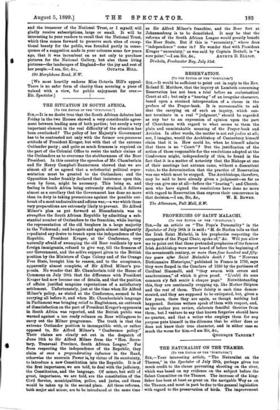THE SITUATION IN SOUTH AFRICA.
[To THE EDITOR OF THE "SPECTATOR."] SIRS It is no doubt true that the South African debates last Friday in the two Houses showed a very considerable agree- ment between leading men of both parties; but surely a very important element in the real difficulty'of the situation has been overlooked? The policy of her Majesty's Government has to be contrasted not only with the former non•possumus attitude of President Kruger, but with that of the extreme Outlander party ; and quite as much firmness is required on the part of the Colonial Office to resist the unfair claims of the Outlanders as to overcome the stubbornness of the Boer President. In this country the speeches of Mr. Chamberlain and Sir Henry Campbell-Bannerman showed that we are almost all of us agreed that a substantial political repre- sentation must be granted to the Outlanders ; and the Opposition leader frankly declared that insistence upon this, even by force, might be necessary. This being so, and feeling in South Africa being extremely strained, it follows almost as a corollary that the Government has done no more than its duty in taking precautions against the possible out- break of a most undesirable and odious war,—a war which those very preparations are extremely likely to prevent. Sir Alfred Milner's plan as put forward at Bloemfontein was to strengthen the South African Republic by admitting a sub- stantial number of Outlanders to the franchise, while leaving the representation of the old burghers in a large majority in the Volksraad ; and he again and again almost indignantly repudiated any desire to trench upon the independence of the Republic. President Kruger, at the. Conference, very naturally afraid of swamping the old Boer residents by new foreign immigrants, refused to give way, till the firmness of our Government, and the active support given to the British position by the Ministers o Cape Colony and of the Orange Free State, brought him to reason, and to the acceptance, apparently almost complete, of Sir Alfred Milner's pro- posals. No wonder that Mr. Chamberlain told the House of Commons on July 20th that the difference with President Kruger had now become one of details, and that the position of affairs justified sanguine expectations of a satisfactory settlement. Unfortunately, just at the time when Sir Alfred Milner's policy, as stated at the Conference, seemed to be carrying all before it, and when Mr. Chamberlain's language in Parliament was bringing relief to Englishmen, an outbreak of dissatisfaction on the part of President Kruger's opponents in South Africa was reported, and the British public was warned against a too ready reliance on Boer willingness to carry out the Milner programme. The truth is that the extreme Outlander position is incompatible with, or rather opposed to, Sir Alfred Milner's " Conference policy." Their claims are clearly set out in the despatch of June 16th to Sir Alfred Milner from the " Hon. Secre- tary, Transvaal Province, South African League." Far from respecting the independence of the Republic, they claim at once a preponderating influence in the Raad, otherwise the suzerain Power is, by virtue of its suzerainty, to introduce a new Constitution into the Republic. It is of the first importance, we are told, to deal with the judiciary, the Constitution, and the language. Of minor, but still of great, importance, we are told, are the constitution of the Civil Service, municipalities, police, and juries, and these would be taken up in the second place. AM these reforms, both major and minor, are to be introduced at the same time
as Sir Alfred Milner's franchise, and the Boer fort at Johannesburg is to be demolished. It may be that the reforms of the South African League would greatly benefit the Boer State. But if this is "suzerainty," where does "independence" come in ? No wonder that with President Kruger "suzerainty," as was said by Captain Bethel!, is "a sore point."—I am Sir, &c., ARTHIIN D. ELLIOT. Dimbola, Freshwater Bay, July 31st.


































 Previous page
Previous page